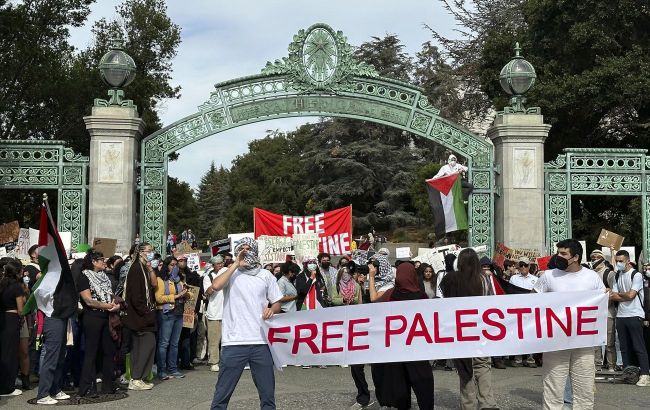Israel or Palestine: How war in Middle East affects the US election
 Pro-Palestinian student protest in the United States (photo: Getty Images)
Pro-Palestinian student protest in the United States (photo: Getty Images)
Tensions in the Middle East are escalating, potentially impacting the results of the upcoming elections in the United States.
RBC-Ukraine explains how the conflict between Israel and Islamist groups affects the sentiments of American voters.
Contents:
Domestic political issues typically dominate voter concerns in the US election. This year, key topics include illegal immigration, rising living costs, economic growth, and abortion. Foreign policy issues generally gain traction only in specific instances where they directly affect American interests, as seen during the Vietnam War in the 1960s and 70s and after the September 11 attacks in 2001. However, this year, foreign policy will also influence the US election, albeit uniquely.
The significance of events in the Middle East for voters
The United States has a significant Jewish diaspora, estimated to range from 5.5 to 8 million people. It is difficult to pinpoint the exact number due to identity issues among individuals of mixed heritage. Nonetheless, most American Jews reside in "blue" states that traditionally support Democrats. New York City serves as the largest Jewish center in the US. Additionally, some Jews living in Israel hold dual citizenship, allowing them to vote in US election.
Conversely, the Arab population in the US is growing, with many generally holding anti-Israel sentiments. Notably, there are several regions in the US where they live in concentrated communities. In swing states like Michigan and Georgia, there are approximately 200,000 and 100,000 Arab Americans, respectively. Both states' support for Harris and Trump is roughly equal, meaning that even a few thousand votes could sway the election outcome.
Trump's stance
During his previous term, Trump unequivocally supported Israel. Under his leadership, the US moved its embassy from Tel Aviv to Jerusalem, a significant symbolic gesture given the city's contested status. Both the Palestinian Authority and Israel claim it as their capital. Additionally, under Trump's administration, Israel brokered the Abraham Accords to normalize relations with several Gulf Arab monarchies, including the United Arab Emirates, Bahrain, Morocco, and Sudan.
Currently, Trump remains firmly aligned with Israel while criticizing the Biden administration. Commenting on the Iranian attack on Israel on October 2, he stated, "Look at the missiles flying right now in the Middle East, look at what’s happening with Russia/Ukraine, look at Inflation destroying the World. NONE OF THIS HAPPENED WHILE I WAS PRESIDENT!"
This stance is partly driven by the fact that a significant portion of Trump’s supporters comprises conservative Christian voters concentrated in the so-called Bible Belt in the southeastern US. For these voters, Israel serves as a crucial element of their cultural identity.
At the same time, a considerable number of American Jews are drawn to the Democratic Party's more left-leaning rhetoric. According to a September 9 poll by a Jewish Democratic group, 68% of Jewish voters plan to vote for Harris, while only 25% intend to support Trump. This trend aligns with patterns observed in previous years. Moreover, 87% of American Jewish voters endorse the Biden administration's efforts to achieve a ceasefire in the conflict between Israel and Hamas.
Nonetheless, the Trump team is also working to appeal to these voters. Republicans portray a grim picture of a Harris presidency, claiming that her administration would be influenced by anti-Israel forces, which they argue could threaten Israel's security.
Harris' stance
Kamala Harris faces a more complex situation. Alongside securing support from American Jews, she needs to attract Arab votes. As such, Harris is attempting to navigate a path that avoids alienating this diverse coalition of voters. She has repeatedly expressed support for Israel's right to self-defense and condemned the actions of Hamas terrorists. She responded similarly to the Iranian attack on Israel.
"I'm clear-eyed Iran is a destabilizing, dangerous force in the Middle East. I will always ensure Israel has the ability to defend itself against Iran and Iran-backed terrorist militias," Harris stated.
However, her statements often include caveats. Harris has also voiced concern regarding the number of Palestinian casualties and has called for an immediate ceasefire.
According to a poll by the Arab American Institute on October 2, Trump receives 46% support among likely Arab American voters, while Harris garners 42%. The Democrats' ambiguous position on the Middle Eastern situation, along with Harris' more left-leaning orientation, deters some Arab voters.
Polling indicates that if Harris called for an immediate ceasefire, 54% of all Arab Americans would support her. If Trump insisted on an immediate ceasefire, 50% of Arab Americans would back him.
Moreover, Harris' ambiguous stance may create challenges with younger voters. Following the initiation of military operations in the Gaza Strip, anti-Israel protests erupted across US and European universities, becoming particularly pronounced in May of this year. However, for younger people, the Middle Eastern conflict remains secondary compared to domestic American issues.
The risk of a major war could further complicate matters. In addition to the challenges of navigating among various electoral groups, military bases throughout the Middle East could also be at risk. This situation has the potential to influence sentiments across the United States.
Earlier, RBC-Ukraine reported on the role of the Ukrainian diaspora in the US election.
Sources: sociological polls and public statements by Donald Trump and Kamala Harris.

